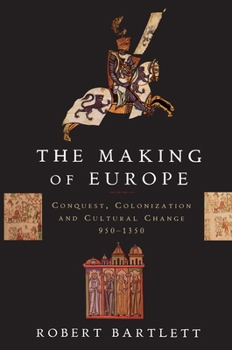The Making of Europe: Conquest, Colonization, and Cultural Change, 950-1350
Select Format
Select Condition 
Book Overview
From our twentieth-century perspective, we tend to think of the Europe of the past as a colonizer, a series of empires that conquered lands beyond their borders and forced European cultural values on other peoples. This provocative book shows that Europe in the Middle Ages was as much a product of a process of conquest and colonization as it was later a colonizer.
Format:Paperback
Language:English
ISBN:0691037809
ISBN13:9780691037806
Release Date:August 1994
Publisher:Princeton University Press
Length:456 Pages
Weight:1.50 lbs.
Dimensions:1.1" x 6.2" x 9.2"
Customer Reviews
4 ratings
The standard for medieval monographs
Published by Thriftbooks.com User , 14 years ago
Absolutely essential reading for anyone looking to understand medieval Europe. It details wonderfully the expansion of what is often just called "medieval culture" from France as it came to dominate all of Europe.
The Making of Europe
Published by Thriftbooks.com User , 18 years ago
I agree with the second reviewer. This is the best history book I have ever read--for many of the reasons already listed. This book should be assigned reading for anyone planning to write history if for no other reason than the quality of the writing, the explanation of complex ideas and the force of its argument. I should add this book has some of the best charts and maps I ever seen, in the sense of how these charts elucidate and highlight the author's arguments. They are wonderfully interwoven in the text The only other non-narratve history possibly as great as this is R.F Fosters Modern Ireland.
Educating Europe?
Published by Thriftbooks.com User , 22 years ago
This is the most enjoyable history book I have ever read. If the history of Europe is a long and interminably complicated one, then I would suggest that this single volume could be the key to unlocking that history and explaining the remarkable diversity of nations and cultures that co-exist within this single, small continent today. The author's clear, unpretentious prose style further enhances the readability of the book and while it is likely to be a must-read for students and academics, the general reader will find this book accessible and entertaining. Bartlett takes the reader on a rapid and utterly fascinating tour of medieval Europe, from the Celtic fringes of the British Isles to the uncharted wildernesses of Eastern Europe, and south to newly-reconquered Spain, between the tenth and fourteenth centuries. Amidst the profound social, religious, political and economic - not to mention shamelessly opportunistic - forces taking hold across the continent in this period, we can already begin to see the origins of the Europe we recognise today beginning to emerge. With countless examples drawn from historical sources from literally every corner of Europe, the reader is nonetheless given a refreshing perspective of the story of the continent as a whole - in human terms, rather than as colours and lines arbitrarily drawn on a map. I would advise anyone with an interest in Europe as it is today, and how it came to be, to read this book. This book affected me quite deeply; I now see European current affairs in a new but much richer context, and I've been compelled to re-examine the way I look at history and its implications for future generations. On another level, I found this book helped me to re-evaluate my outlook on some of the concepts we often take for granted, such as nationality, culture and identity. I can't help thinking, therefore, that by reading this book and reflecting on its implications, many Europeans or North Americans of European extraction might want to take a fresh look at the meaning of their own identities and prejudices. Ethnic, religious, nationalistic, cultural and linguistic sources of tension and conflict can be identified, often at source, throughout the pages of this stunning book. And, for all the bloodshed and medieval argy-bargy, there's the unexpected bonus of the occasional giggle. Splendid.
History made relevant -- and alive.
Published by Thriftbooks.com User , 23 years ago
The thesis of The Making of Europe is simply that Europe is not a geographical region but an idea. The power and eloquence of this statement is played out in over four hundred pages of tightly constructed and well written prose. Bartlett's writing makes for powerful and alluring reading, and I came away from reading much of the book educated and armed with an understanding of how we come to construct others as well as ourselves. Bartlett takes an intellectual historian's approach to how Europe came to be "made;" arguing that the continent was born out of the concepts of conqueror and conquered. This mentality had as much to do with the shaping of Europe as did the actualities of history. I first used the book as a reference for my undergraduate senior thesis and have since read most of it for its intellectual force and beauty of writing. Bartlett makes the usually dry subject of history moving and relevant to modern day people.





